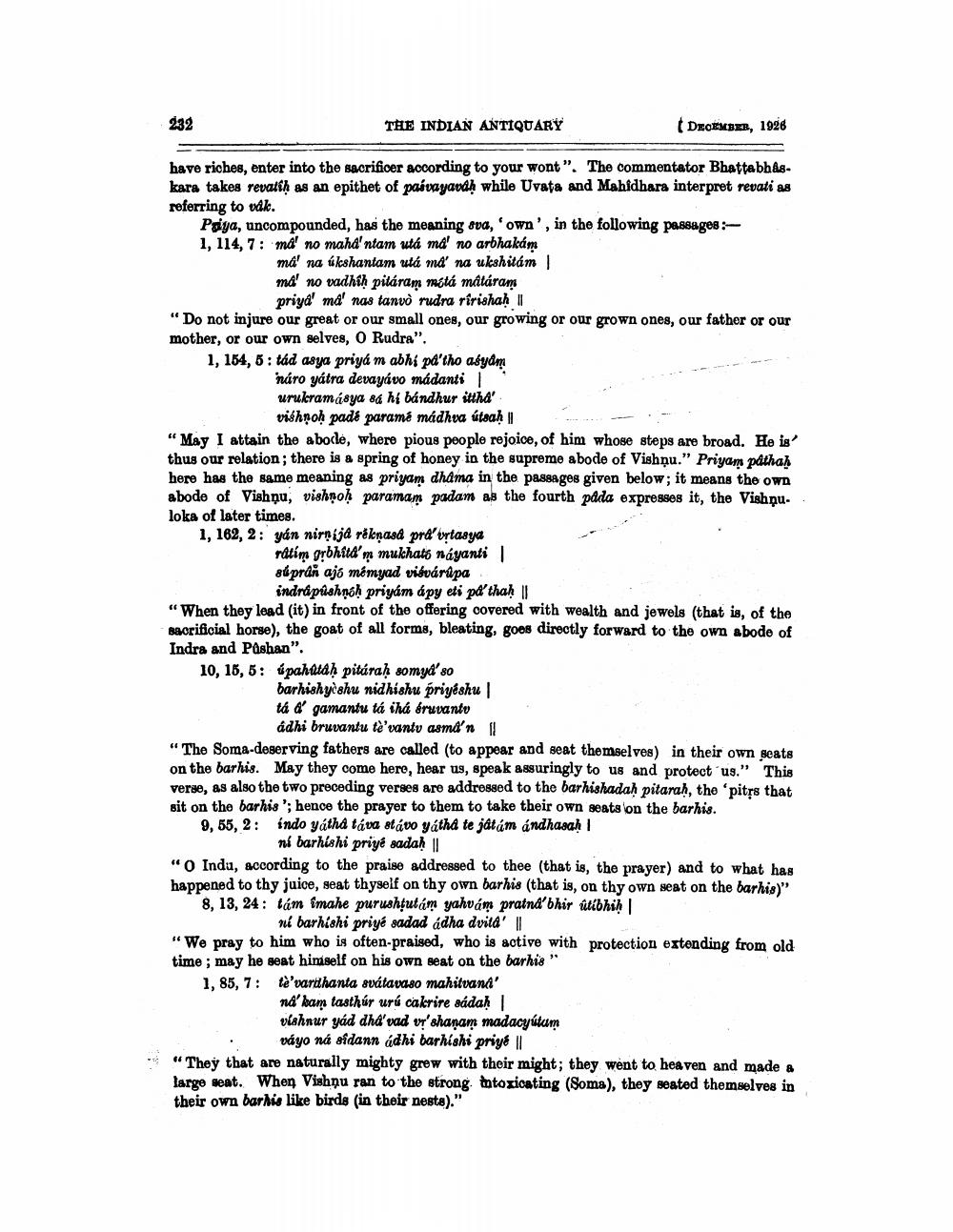________________
232
THE INDIAN ANTIQUARY
DECEMBER, 1926
have riches, enter into the sacrificer according to your wont". The commentator Bhattabhaskara takes revalih as an epithet of pašvayavdh while Uvata and Mahidhara interpret revati as referring to vák.
Priya, uncompounded, has the meaning sva, own', in the following passages - 1, 114, 7: ma' no mahd' ntam utá mal no arbhakam
má na úkshantam utá ma' na ukshitám ma no vadhih pitáram nétá mátáram
priya' ma' nas tanvò rudra ririshah || "Do not injure our great or our small ones, our growing or our grown ones, our father or our mother, or our own selves, O Rudra". 1, 154, 6: tad asya priya m abhi pa'tho aśyam
náro yátra devayávo mádanti urukramásya sa hi bandhur ittha'
vishnok padé paramé madhva útsah || “May I attain the aboclé, where pious people rejoice, of him whose steps are broad. He is thus our relation; there is a spring of honey in the supreme abode of Vishņu." Priyan páthah here has the same meaning as priyam dhama in the passages given below; it means the own abode of Vishnu, vishnoh paraman padam as the fourth pada expresses it, the Vishnu. loka of later times. 1, 162, 2: yan nirnija réknasd prá' vrtasya
rätím orbhità'm mukható nayanti abprán ajó mémyad vifvárúpa
indrá půshnih priyám ápy eti páthah | “When they lead (it) in front of the offering covered with wealth and jewels (that is, of the sacrificial horse), the goat of all forms, bleating, goes directly forward to the own abode of Indra and Pashan". 10, 15,5: pahatah pitáraḥ somyd' so
barhishyishu nidhishu priyeshu tá d' gamantu tá iha éruvanto
adhi bruvantu tè'vanty asma'n f! « The Soma-deserving fathers are called (to appear and seat themselves) in their own seats on the barhis. May they come here, hear us, speak assuringly to us and protect us." This verse, as also the two preceding verses are addressed to the barhishadah pitarah, the 'pitrs that sit on the barhis '; hence the prayer to them to take their own seats on the barhis. 9, 55, 2: indo yátha táva stávo yátha te jätám ándhasah
ni barhishi priye sadah | " Indu, according to the praise addressed to thee (that is, the prayer) and to what has happened to thy juice, seat thyself on thy own barhis (that is, on thy own seat on the barhis)" 8, 13, 24: tám imahe purushtutám yahvám pratnd'bhir útibhih!
rul barhishi priyé sadad adha dvita' || "We pray to him who is often-praised, who is active with protection extending from old time ; may he seat himself on his own seat on the barhis" 1,85, 7: tè'vardhanta svátavaso mahitvana'
ná' kam tasthúr urí cakrire sádah vishnur yad dha'vad vy'shanam madacyútum
váyo na sidann ádhi barhishi priya || "They that are naturally mighty grew with their might; they went to heaven and made & large seat. When Vishņu ran to the strong tatoxicating (Soma), they seated themselves in their own barhis like birds in their nests)."




